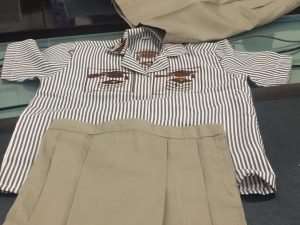
The pro NPP Pressure group, Alliance for Accountable Governance (AFAG) is surprised about government’s decision to introduce a new uniform for public junior high schools.
AFAG in a statement also questioned the rationale for the decision and described it as ill-informed.
According to AFAG, government must instead focus on providing infrastructure for schools and finding innovative ways of improving academic performance.
“AFAG is surprised at the focus of government and the introduction of the policy at this juncture. Should government’s attention not be on infrastructure and teaching performance instead?” the group asked in a statement.
The announcement by the Ghana Education Service takes effect from September 2019. The decision has already been met with stiff opposition with many describing it as a misplaced priority.
“Has government considered the financial impact of this policy on existing business class operating in the garment sector? Introducing this policy in the coming 2019-2020 academic year is ill-advised. It would ruin lots of businesses, which have stocked garments for the current uniforms,” AFAG added in the statement.
New uniform shows GES is paying attention to students – Annis Hafar
An educationist, Annis Hafar had earlier backed the decision by the Ghana Education Service (GES) to introduce a new school uniform for JHS students.
According to him, the introduction of the uniform shows that GES is paying attention to JHS students thus giving students a sense of importance.
“Bringing in something new never hurts, we live in a very dynamic world, we don't want things to be so static. We want the children to see that it is a new day, there are new expectations and there is nothing wrong with changing uniform as long as there is enough for them to wear. The psychology is important in the sense that they would feel we are paying attention to them[Junior High School (JHS) students]. Being hygienic is part of a school system that supports the psychology of student, ” he said.
Below is the full release by AFAG
“AFAG has noted a publication in the Daily Graphic dated 11th April 2019 on the introduction of new school uniforms for JHS students. Since school uniforms have no scientific impact on raising the falling standards of education in public schools, AFAG is surprised at the focus of government and the introduction of the policy at this juncture. Should government attention not be on infrastructure and teaching performance instead?
Has government considered the financial impact of this policy on existing business class operating in the garment sector? Introducing this policy in the coming 2019-2020 academic year is ill-advised. It would ruin lots of businesses, which have stocked garments for the current uniforms.
If government insists on going forward, AFAG proposes that;
1. Three years advance notice would not be a bad idea for businesses that stocked the existing school uniform to exhaust their current stocks to prevent lots of tears. Currently, AFAG estimates that stocks in the old uniforms runs between $35m to $50mn USD. The sector employs about 1,200 people including importers, distributors and retailers. Large portions of capital of banks and other landing institutions are tied up in most of these businesses. An abrupt move as proposed by the government put these investments at risk.
2. Government should allow both uniforms to run concurrent for at least five academic years to enable operators in the sector to land softly.
3. Why are parents to pay for uniforms for JHS students whilst SHS students need not pay for uniforms under Free SHS? It is not logical?
4. In the event parents are eventually asked to pay for their wards uniforms, government must no way prescribe suppliers. The private sector must be allowed to openly compete for market share.
AFAG strongly believes that this is not the time for government to undertake such decision, which would jeopardize businesses and undermine the precarious larger private sector.”
–citinewsroom




 We’ll no longer tolerate your empty, unwarranted attacks – TUC blasts Prof Adei
We’ll no longer tolerate your empty, unwarranted attacks – TUC blasts Prof Adei
 Bawumia donates GHc200,000 to support Madina fire victims
Bawumia donates GHc200,000 to support Madina fire victims
 IMF to disburse US$360million third tranche to Ghana without creditors MoU
IMF to disburse US$360million third tranche to Ghana without creditors MoU
 Truck owner share insights into train collision incident
Truck owner share insights into train collision incident
 Paramount chief of Bassare Traditional Area passes on
Paramount chief of Bassare Traditional Area passes on
 Two teachers in court over alleged illegal possession of BECE papers
Two teachers in court over alleged illegal possession of BECE papers
 Sunyani: Victim allegedly shot by traditional warriors appeals for justice
Sunyani: Victim allegedly shot by traditional warriors appeals for justice
 Mahama vows to scrap teacher licensure exams, review Free SHS policy
Mahama vows to scrap teacher licensure exams, review Free SHS policy
 Government will replace burnt Madina shops with a new three-story, 120-store fac...
Government will replace burnt Madina shops with a new three-story, 120-store fac...
